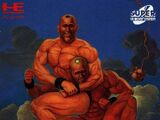Cho Aniki (超兄貴 Chō Aniki, lit. "Super Big Brother") is a Japanese video game series originally developed by Masaya and published by NCS Corp. The first game debuted in 1992 for the PC Engine system. The game's sequels and spin-offs later appeared on the Super Famicom, PlayStation, Sega Saturn, WonderSwan, PlayStation 2 and PlayStation Portable. Mainly consisting of side-scrolling shoot 'em up in the vein of Gradius, the Cho Aniki series is best known for its homoerotic overtones, wacky humor and vivid, surreal imagery. Most of the games have never seen release outside Japan.
For various reasons, the popularity of the Cho Aniki games has endured since the series' debut. Highlights of the various games include in-game music, innovative control schemes or sheer kitsch value. In Japan, these games are examples of baka-ge, a type of kuso-ge. "Baka-ge" literally means "idiot game" while "kuso-ge" literally means "shitty game" or "shit game". Baka-ge's appeal lies in its campiness.
Occasionally, the title is transliterated as "Choaniki", "Chou Aniki", or (erroneously) "Cho Eniki".
The rights to the series are currently owned by Extreme Co., Ltd., which had obtained the rights of NCS Corp. and Masaya products and trademarks.
Series[]
- Cho Aniki, PC-Engine CD (1992)
- Ai Cho Aniki, PC-Engine CD (1995)
- Cho Aniki: Bakuretsu Ranto Hen, Super Famicom (1995) (fighting game spin-off)
- Cho Aniki: Kyuukyoku Muteki Ginga Saikyou Otoko, Saturn, PSX (1996)
- Cho Aniki: Otoko no Tamafuda, WonderSwan (2000) (RPG/card game spin-off)
- i Cho Aniki: Gekiretsu Nawatobi-hen, Mobile (2001) (sports spin-off)
- Cho Aniki: Seinaru Protein Densetsu, PS2 (2003)
- Cho Aniki Zero, PSP (2009)
Music[]
The first game was composed entirely by Koji Hayama, who states on his website that Cho Aniki is his favorite work to date. Numerous soundtracks from the various games have been released on CD, Maxi-Singles and even a live performance has been released on VHS. Later games in the series were composed by Taku Iwasaki, Isao Mizoguchi (under the alias Don McCow) and Sanae Kasahara.
Cho Aniki in pop culture[]
Appearances in other games[]
Masaya also developed the Langrisser series, where Samson and company make a cameo. A hidden level takes the party to an area called the Muscle Shrine, where they must fight Samson. If victorious, the party can then use the Aniki summon, the most powerful in the game. The cameo exists in the Mega Drive, Super NES and PlayStation ports of the game.
The Capcom video game, God Hand, pokes fun of Samson and Adon as powerless yet flamboyant drag queens who are the first boss of the game.
Though technically not part of the series, the Sega Genesis shoot-em-up Wings of Wor (known as Gynoug in Japan and Europe) was also developed by Masaya and published by NCS, and features gameplay and surreal designs similar to the first Cho Aniki game.
The Japanese release of the Game Boy Advance game Gem Smashers replaces the three playable characters with three differently colored versions of the Uminin (the original light blue Uminin, and a pink and green Uminin as well)
Samson and Adon[]
These series mascots are the personification of phallic imagery. For example, they shoot white energy beams from the holes in their heads called the "Men's Beam," which is charged up with every firing by both of them rapidly pelvic thrusting into the air. The pair are never specified as lovers or even necessarily homosexuals in the earlier series. However, in "The legend of Holy Protein", both Samson and Adon's preference are spelt out as "men".
Cult popularity[]
Few gamers outside Japan have played the Cho Aniki series, but many know of the game through articles written about it on such websites as I-Mockery, Seanbaby, and Something Awful. The series is often mentioned in lists of outrageous, peculiar or sexual video games.
Some time around 1999, gaming magazine Electronic Gaming Monthly ran a passing comment about how the US was thankfully spared this homoerotic shooter (Referring to Cho Aniki for PS1, although the comment was followed by "Not that there is nothing wrong with a homosexual shooter"). For the next few months EGM's letters to the editor were dominated by remarks lambasting the editors at EGM for making fun of the game, even after the editors repeatedly told their readership that the game was horrible.
| This page uses Creative Commons Licensed content from Wikipedia (view authors). |
All items (3)




